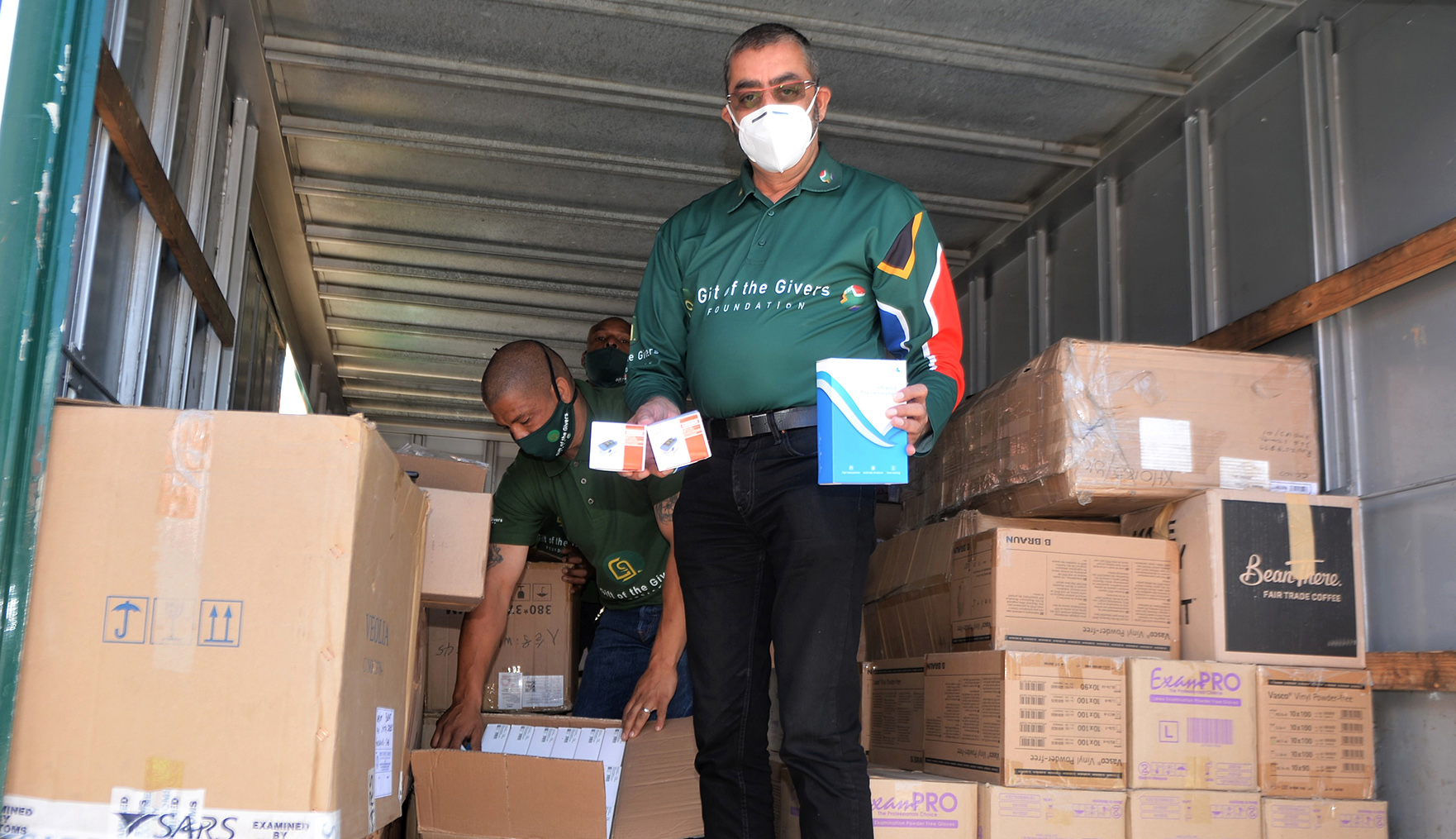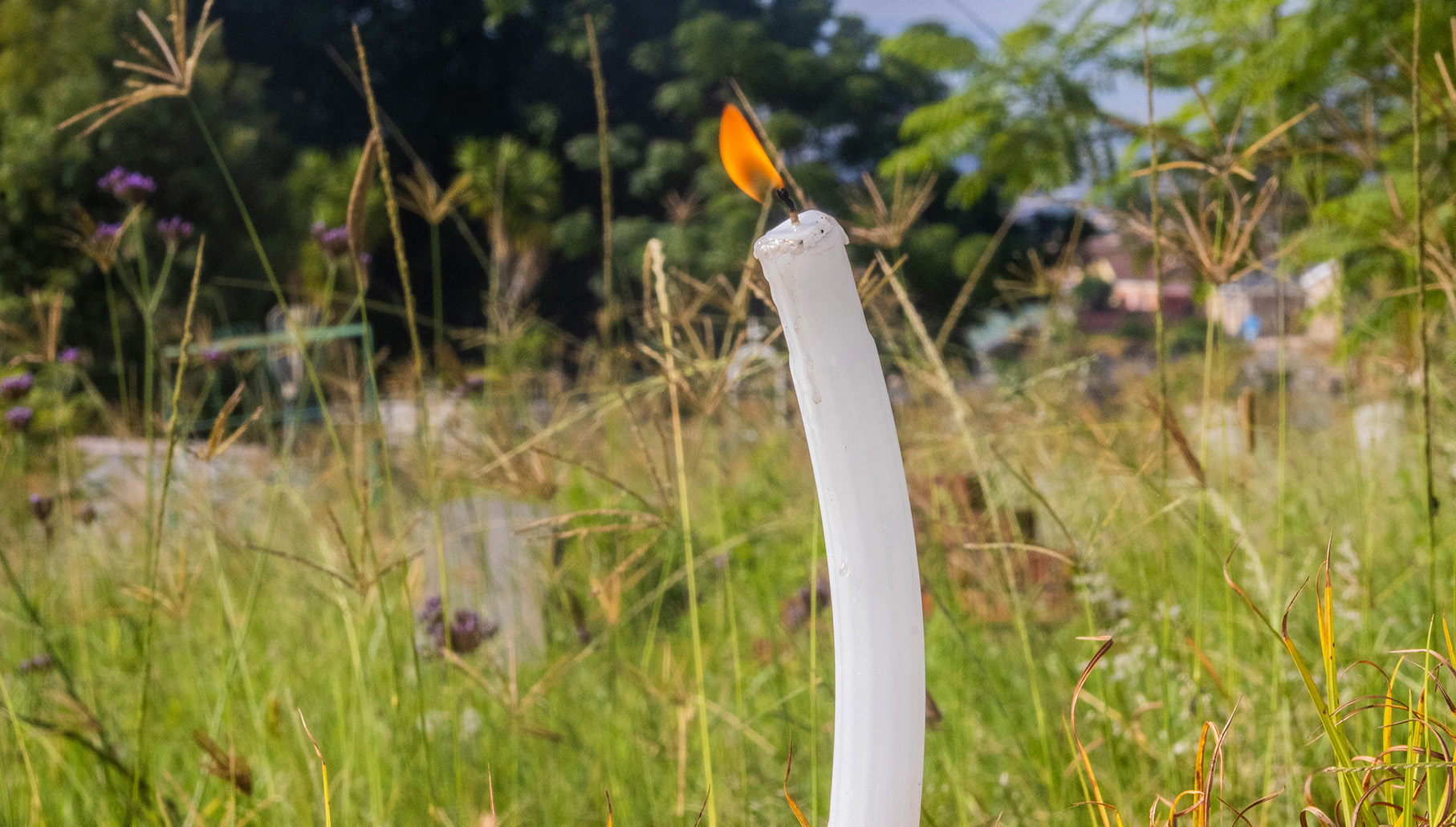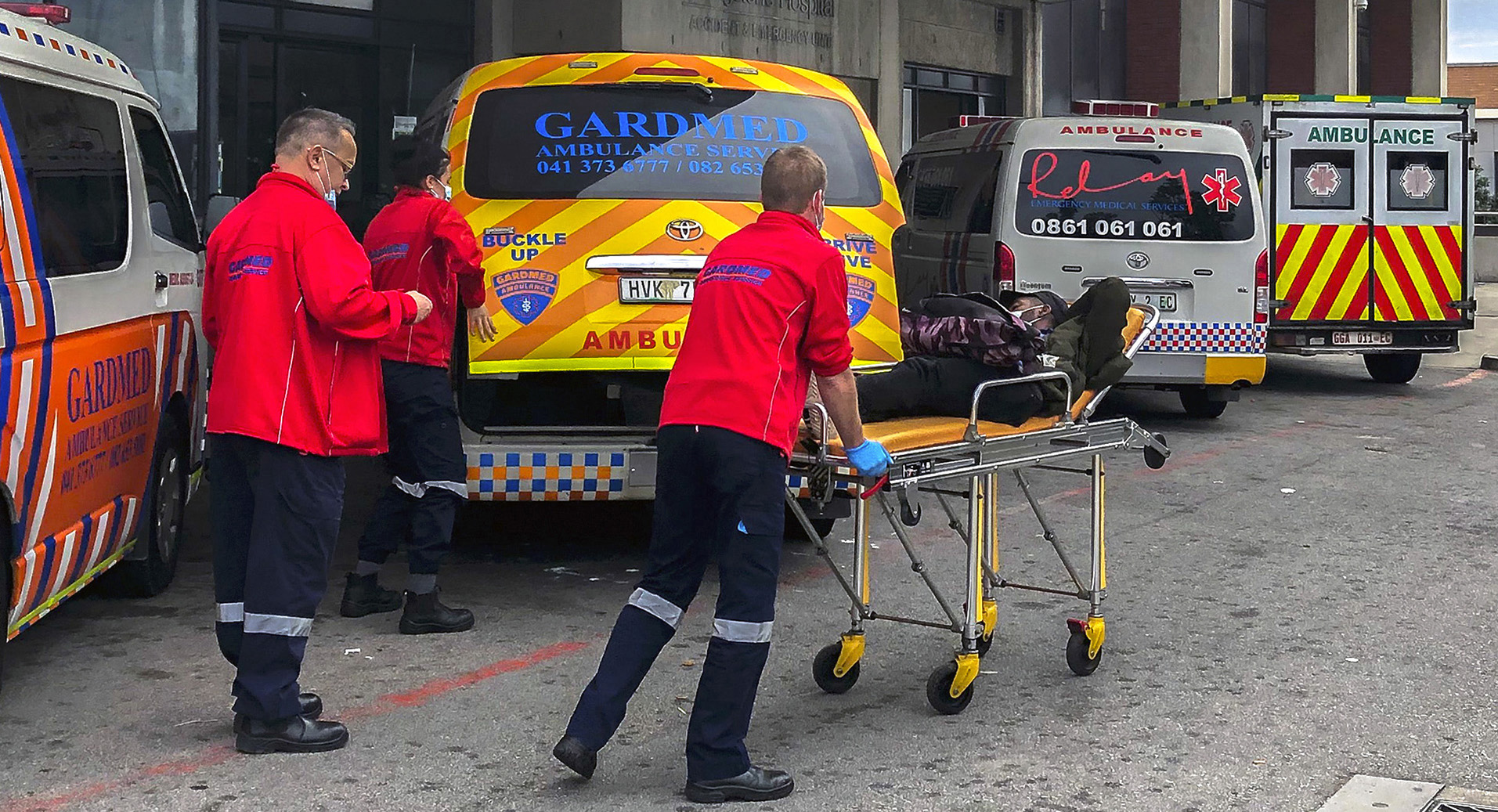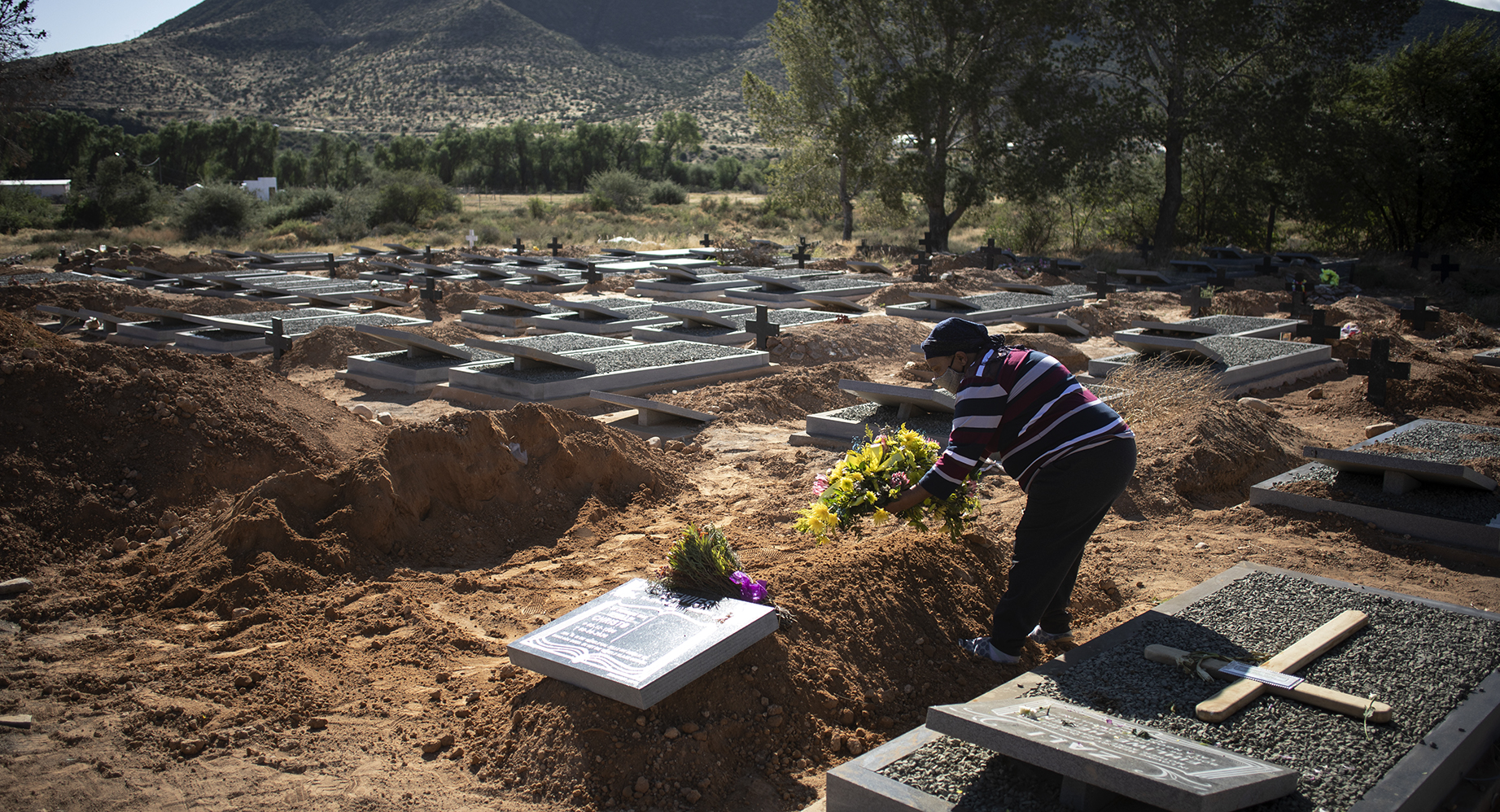It was a fight they were never going to win.
In December 2020, seasoned emergency responder Dr Imtiaz Sooliman from Gift of the Givers said outright that the second Covid-19 wave in the Eastern Cape was a “total disaster”.
This was due to a deadly combination of patients arriving at the hospital, already severely hypoxic (low levels of oxygen in their blood) because of Covid pneumonia, overwhelmed staff members, a persistent stigma attached to treating Covid-19 patients and complete systemic collapse aggravated by the inept presence of then Health MEC, Sindiswa Gomba, who would later be fired.
To save some lives, Sooliman said at the time, it was necessary to act with great speed.
Now details of the fatal and futile battle, valiantly fought by an ever-diminishing contingent of health workers in a collapsing department where oxygen supply was patchy and years of neglect had taken its final toll, has emerged in an audit conducted to ascertain the reasons behind the sky-high death rate in the Eastern Cape during the Covid-19 pandemic.
The findings of the audit are at this stage based on numbers and hospital records, but will be followed up by a qualitative audit that will involve interviews and personal experiences of health staff, including:
- That a large number of patients came to the hospitals only when their oxygen saturation (sats) were already dangerously low;
- That delays in supplying most hospitals with high-flow oxygen restricted the treatment options available as the condition of patients deteriorated;
- That many patients were effectively barred from accessing higher levels of treatment due to bed restrictions in hospitals offering higher levels of care;
- That often, community service doctors were left as the last people standing in rural hospitals and had to look after patients; and
- That overwhelmed hospitals “missed” follow-up medical assessments of patients with some dying after their conditions had not been assessed for up to six days.
 Dr Imtiaz Sooliman from Gift of the Givers in one of the truckloads of equipment, PPE and medical supplies he brought to Nelson Mandela Bay at the time of the second wave. (Photo: Deon Ferreira)
Dr Imtiaz Sooliman from Gift of the Givers in one of the truckloads of equipment, PPE and medical supplies he brought to Nelson Mandela Bay at the time of the second wave. (Photo: Deon Ferreira)
The audit was performed, on the request of the department, by doctors John Black, head of the Infectious Diseases and HIV Unit at Livingstone Hospital; Margaret Ntlangula from the provincial health department; Dr Jenny Nash, rural health expert and specialist family physician; Dave Stead, head of medicine at Cecilia Makiwane Hospital in East London; Dr Ramprakash Kaswa from the Department of Family Medicine and Rural Health at Walter Sisulu University; Prof Mervyn Williams, former head of cardiothoracics at the Livingstone Hospital Complex and Dr Ruvimbo Chingonzoh, a provincial epidemiologist at the National Institute for Communicable Diseases.
Their research looked into the deaths in the Eastern Cape during South Africa’s second wave of coronavirus infections. The second wave was driven by the Beta variant first identified in Nelson Mandela Bay in the Eastern Cape. In the Eastern Cape, the wave started in late October 2020 and continued to January 2021.
The toll taken by the new wave of infections saw the provincial recovery rate drop below 88%.
The report on the deaths in the province has never been officially released by the Eastern Cape Department of Health — despite several requests for the full report. The department has insisted for a long time that the main reason for the deaths in the province was the late arrival of patients at health facilities. A separate audit done by Ntlangula alone, according to health communicators at the time, found this to be the case.
In November 2020, optimistic claims put the death incidence in the province at around 63 per 100,000 with a higher rate in the two metros, but later the then minister of health, Dr Zweli Mkhize, requested an audit of the death figures for the province. Hospital figures at the height of the wave at the end of November and December showed that 26% of patients admitted to hospitals in the province had died, with 75% of deaths occurring in the public sector.
But then December came and the province recorded more than 600 deaths, including the demise of 137 health workers, in the first two weeks.
By 7 February 2022 16,361 people in the province had been confirmed dead of Covid-19-related complications in just under two years. The Medical Research Council estimated another 50,257 excess deaths due to natural causes in May 2020. Their estimation of 764 per 100,000 of the population puts the Eastern Cape death rate among the highest in the world and by far the highest in South Africa.
 A candle at Mbuqe graveyard in Mthatha in the Eastern Cape, where several Covid-19 victims are buried. (Photo: Hoseya Jubase)
A candle at Mbuqe graveyard in Mthatha in the Eastern Cape, where several Covid-19 victims are buried. (Photo: Hoseya Jubase)
The audit highlights the dire conditions that the department found itself in at the time. However, current superintendent-general Dr Rolene Wagner, who was appointed only in August 2021 after the end of the third wave of coronavirus infections in the province, has promised to address hospital conditions. But the department is (still) in serious financial trouble and has admitted this week that it must now negotiate with creditors to obtain life-saving medicine.
The provincial department of health received only R1.34-billion of the R5.2-billion it had requested in the midterm budget — the department had indicated that R4.4-billion was needed to cover unpaid bills. Its request in the adjustment budget exceeded the available provincial cash reserves that stood at R3.5-billion.
The department’s dire financial situation coupled with longstanding systemic issues were reflected in the stark realities of Covid-19 deaths described in the second-wave audit.
A glimpse into how understocked hospitals were at the time is starkly reflected in a “shopping list” Sooliman asked for when he decided to intervene in the crisis.
The teams needed coveralls, disposable gowns, shoes and caps, surgical masks, N95 masks, sterile and non-sterile gloves, aprons, goggles, visors, hand sanitisers, soap, masking tape for the floor, 50 brown paper bags for masks, a hanging rack for PPE gowns, coat hangers, large buckets, drying racks, Prestik and Koki pens.
Ward outreach teams asked for oximeters, blood pressure cuffs, hats and sunscreen.
The doctors asked for 50 oxygen ports and pulse oximeters.
From personal accounts by a doctor who asked to remain anonymous, it also became clear that fear ruled in the province’s hospitals — especially in the early days when there was a struggle to obtain sufficient personal protective equipment.
“There was hesitancy in some facilities to treat Covid patients. This could have been fear, lack of appropriate PPE, lack of good infrastructure, lack of guidelines to follow, poor clinical leadership and a lack of teamwork.”
For the purposes of the audit, hospitals were chosen for their high admission rates and high fatality rates. Facilities included in the audit were Cecilia Makiwane Hospital in East London, Livingstone Hospital in Gqeberha, Mthatha General Hospital in Mthatha, Taylor Bequest Hospital in Matatiele, Uitenhage Provincial Hospital and Victoria Hospital in Alice. The review included a look at bed capacity, the availability of equipment, clinical governance and referrals. Teams from the National Department of Health and the NICD chose the facilities to represent district, regional and tertiary hospitals. Files were randomly selected from each facility by the NICD, which provided a list per facility.
The review found that the oxygen saturation of patients who had arrived at these hospitals was very low — an indication of having waited too long or being delayed for too long before they accessed care. But once patients had been admitted there was also slow progress in escalating treatment due to insufficient oxygen ports as well as a lack of high flow oxygen, nasal cannulae and other necessary equipment. Some patients had neither IV lines for drips nor high flow oxygen available to them.
Other findings from the patient review include:
- Some patients faced delays of up to two days for admission to Covid-19 wards due to bed shortages;
- A third of patients who died were admitted from home;
- Sats on average for patients who died were 80% (Normal sats are between 95% and 100%). At Cecilia Makiwane, patients were seen who on average presented with sats at 79%, Livingstone 73%, Mthatha 80%, Taylor Bequest Hospital 81.5%, 80% at Uitenhage Provincial Hospital and 80.5% at Victoria Hospital;
- As there was insufficient equipment, not all patients could be assisted with high flow oxygen; and
- Critical care was offered to only a fraction of patients with just 2% having accessed High Care and only 3% having been seen in the intensive care unit.
 Ambulances at Livingstone Hospital in the Eastern Cape at the height of the second wave in 2020. (Photo: Shiraaz Mohammed)
Ambulances at Livingstone Hospital in the Eastern Cape at the height of the second wave in 2020. (Photo: Shiraaz Mohammed)
The report also found that in some cases blood work had not been done or repeated, blood results were not documented and in some cases not followed up, in some cases lumbar punctures were not done and neither were CT scans and no work up plans were done to deal with seizures, delirium or fits.
Only in 16 out of 129 records assessed did the team not find any concerns in the way patients were handled.
Other concerns included the under-dosing of steroids and delays in administering anticoagulants, steroids and antibiotics.
The medical management of serious conditions, like coughing up blood, was “inadequate” according to the report.
Patients who died also had underlying cancers, some died of hospital-acquired infections, kidney and liver failure, stroke and complications due to uncontrolled diabetes and hypertension, and also HIV-associated meningitis, Aids and tuberculosis.
The report also highlights that many patients were not assessed daily (26%) and some were not seen for clinical assessments for seven days. In 77% of cases, patients were not seen for up to three days while 13% of patients were not assessed for more than six days.
The team also found missing prescriptions and treatment charts for both Covid-19 and non-Covid conditions and that there was poor glucose monitoring in diabetic patients, and a lack of access to intermediate or long-acting insulin.
Investigators raised concerns over the oxygen therapy administered in about one third of cases with most of these being at the remote Taylor Bequest Hospital in Matatiele and Victoria Hospital in Alice.
In many cases there were also no plans to escalate oxygen therapy, and the team found substandard oxygen saturation monitoring. There was also a lack of action taken to address suboptimal oxygen when this showed up on vitals monitoring.
The review team also highlighted the lack of information written in the patient charts, with almost no details recorded including the height and weight of patients, no monitoring tools were used to make decisions, treatment charts were missing and laboratory results were missing.
A second audit specifically in the three rural districts with the highest fatality rates was commissioned by the Department of Health in 2021 with the current MEC of Health, Nomakhosazana Meth saying that this will be done in conjunction with experts from the World Health Organization. At the time, epidemiological reports showed that 44% of patients admitted for Covid-19 died in hospital in the Joe Gqabi District, which has the highest case fatality rate in the Eastern Cape. DM/MC
Read Part Two here and Part Three here




 Ambulances at LIvingstone Hospital at the height of the second wave in 2020. (Photo: Shiraaz Mohammed)
Ambulances at LIvingstone Hospital at the height of the second wave in 2020. (Photo: Shiraaz Mohammed) 